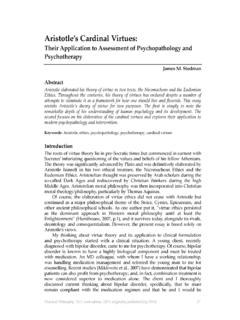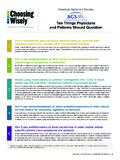Transcription of Aristotle and the Good Life - About the Society
1 4 Philosophy Autumn 2005 Aristotle , I was informed by a literary agent I came across awhile ago, is not sexy . If that means boring, irrelevant,unexciting, I strongly disagree. But this comment alertedme to the fact that Aristotle s image is unfairly tarnished,which is bound to have the unfortunate effect of stoppingpeople tapping into the rich veins of wisdom to be foundin his work.
2 I d like to start by quickly addressing themain reasons for this lack of street cred :He had some pretty silly views About some things (women,slaves and so on), and this is often taken to imply that hecan t possibly be relevant to us. But it doesn t follow thatsince his ideas on some things were silly, his ideas on allthings were silly. They most certainly were not. All bodiesof thought are likely to suffer from cultural influences thatwill not stand the test of gave reason a central place in human life , and modernperspectives tend to be sceptical of this (see P forpsychoanalysis, postmodernism).
3 We should indeed behumble About what reason can achieve. But it doesn tfollow that, because our reasoning abilities are limited,they therefore have little value. Although limited, theability to reason is a central feature of human life andshould be treated as style is neither clear which is why there are so manyinterpretations of his work nor easy to read: it has beendescribed as having a dry conciseness that makes oneimagine one is perusing a table of contents rather than abook; it tastes for all the world like chopped hay.
4 But it isworth persevering: many gems are hidden among the , he is let down by traditional translations of keyterms. Eudaimonia should not be translated as happiness Aristotle is not talking About a state of mind. And virtue ,with its connotations of Victorian chastity, sets our mindsrunning along the wrong track. But I have to acknowledgethat suitable alternatives are not always believe that Aristotle s ideas are invaluable and entirelyrelevant to people who want to live a rich, rewarding lifein the modern world. One of the themes I have foundmost useful is his discussion of what such a life mightinvolve.
5 In this article I would like to review each of themain ingredients considered by Aristotle and defend areading of his recipe for a good ingredients of the good lifeIt is often pointed out to the point of being a clich thatone of the difficulties of living in the modern world is thecrumbling of traditional certainties and ensuing confusionabout what values to hold and what aims to pursue. Timeis limited, and we are torn between competing aims: career,family, personal development, education, success, money andso on. Often we have no clear way of negotiating these: foreach piece of advice, a conflicting one is forthcoming fromanother source.
6 The prevailing ethos is that these kinds ofchoices are wholly subjective and should be made on thebasis of some kind of feeling or intuition but how to decidewhether to trust that? In the light of this predicament, Aristotle s discussion of the good life is at the very least foodfor thought. His view that there are certain things that justare essential to living a fully human life , and to that extentare non-negotiable, challenges the givens of a other philosophers of his time, Aristotle talks About theultimate good being eudaimonia a good life , a flourishinglife, a fulfilled and worthwhile life .
7 As he himselfacknowledges, however, simply naming it does not tell usmuch About what sorts of ingredients are required for such alife, so he starts by considering various popular contenders money, success, pleasure, relationships. His discussion ofthis topic is an excellent starting point for reflection, on ourown or in the context of philosophical and successMoney is clearly only a means to an end, therefore it can t bethe main good . On the other hand, Aristotle does notadvocate a life of renunciation a moderate quantity ofmaterial comforts is necessary for our well-being.
8 And atruly blessed life would be prevented by great what really determines the quality of our lives is notour circumstances themselves but what we make of them just like a general takes the most strategically appropriatedecision with the army at his disposal, or a shoemakermakes the best possible shoes with the leather he is given,to use Aristotle s metaphors. Success (or honour) can t bethe main good either, since (a) it s too dependent on otherpeople and the whims of fortune, and (b) we don t justwant to be honoured and recognised we want to berecognised by people we admire and for a good reason (orat least we should).
9 PleasurePleasure is certainly not the main good , and people whosemain interest lies in bodily pleasures are described as living lives that are fit only for cattle . But Aristotle ends updefending pleasure in two ways: (a) even purely bodilypleasures are good in moderation we are embodiedcreatures, and too little appreciation of bodily pleasures canAristotle and the good LifeAntonia MacaroEudaimonia is addressed in books I and X of the NicomacheanEthics. Additionally, pleasure is discussed in book VII andrelationships in books VIII and hinder our pursuit of a good life .
10 It is only excessiveindulgence that is damaging and distracts us from moreworthwhile pursuits. Also, (b) there are different kinds ofpleasures, and the best kind is that deriving from beinginvolved in some worthwhile activity. Notice the direction ofthe causal arrow: value pleasure rather than pleasurexx value. An important question here is: can we really saythat doing something worthwhile just is pleasant? And ifwe conclude that worthwhile and pleasant experiences don talways coincide, to which should we give priority in our life ?An Aristotelian answer might be that in order to have atruly good life we should aim for a balance of both butthis might not be as easy as it are very important in a good life .











